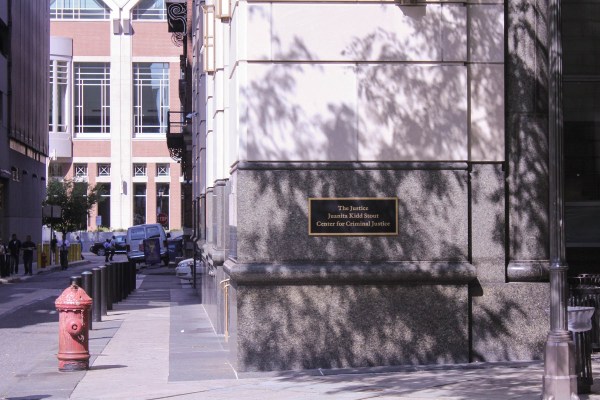
Philadelphia’s Center for Criminal Justice, which houses the Jury Selection Commission. /Kristi Petrillo
By Austin Nolen and Shealyn Kilroy
For at least six years and possibly longer, Philadelphia court officials have wrongfully disqualified individuals from serving as jurors, according to data obtained by The Declaration, and this practice continues today for potential jurors who fill out their questionnaires online.
In Pennsylvania, people with criminal convictions that carry a maximum possible sentence of more than one year can be barred from jury service. Those convicted of crimes with lesser penalties, such as most first-time DUI offenses or possession of small amounts of marijuana, are not disqualified.
However, for most of the term of Jury Selection Commissioner Daniel Rendine, court officials sent jury summons asking potential jurors about any criminal convictions and automatically disqualified all those who answered yes, including potential jurors qualified under state law.
A review by The Declaration of a list of potential jurors disqualified in 2014 suggests that the number of wrongfully disqualified jurors could range from hundreds to over one thousand a year.
This list is a public record by law, but court officials did not release it to The Declaration until we filed a lawsuit to force its disclosure.
From a list of 13,585 people disqualified for criminal convictions in 2014, The Declaration selected a simple random sample of 100 jurors. Then, the name of each of the 100 jurors were searched and reviewed in Pennsylvania’s public dockets.
If individuals had convictions for crimes with a maximum sentence of over one year, we counted them as properly disqualified. The Declaration also counted as properly disqualified anyone with no criminal dockets in Pennsylvania on the assumption that, if they checked the conviction box, they might have disqualifying convictions in other states.
The conservative final estimate was that five possible jurors out of the sample of 100 were wrongfully disqualified.
Basic statistical tools, similar to those used to determine the margin of error in opinion polling, determined that there was a 90% chance that between one and nine percent of the total population of 13,585 were similarly disqualified.
Thus, the number of jurors wrongfully disqualified in 2014 likely falls between 135 and 1,222. Commissioner Rendine declined to comment on or respond to these numbers.
Rendine was appointed as Jury Selection Commissioner for the Philadelphia courts in 2011 and according to court officials, the flawed question has been in use at least since he entered office.
Court officials were unable to confirm that the same questions were asked prior to his appointment but did not dispute that the same questions were probably asked for some period of time prior to 2011.
Rendine’s first full year in office was 2012, and if the similar patterns occurred in other years in his term, his office may have wrongfully disqualified between 540 and 4,888 jurors before 2016. This does not take into account those jurors who may have been wrongfully disqualified before Rendine assumed office.
In 2016, the Jury Selection Commission changed the paper forms so that only individuals with convictions for crimes with a maximum sentence of over one year would answer yes and be disqualified.
However, the Commission has not updated its online questionnaire system, eJuror. Anyone who fills out their summons response online will still see the improper question about any criminal history.
When asked about the continuing problems with the online form, Rendine told The Declaration that he “has been working with the eJuror vendor to address any inconsistencies that may exist between our paper summons and the information found on eJuror.”
The U.S. Supreme Court has ruled that the Constitution requires that lists of prospective jurors represent a “fair cross-section of the community.”
In 1975, the court ruled that “the purpose of a jury is to guard against the exercise of arbitrary power — to make available the common sense judgment of the community… Restricting jury service to only special groups or excluding identifiable segments playing major roles in the community cannot be squared with the constitutional concept of jury trial.”
The size of the segment of the Philadelphia population potentially disqualified by the improper questions is vast. In 2014, according to the Pennsylvania State Police Uniform Crime Reporting System, 4,362 adults were arrested in Philadelphia for DUI.
Many of these arrestees were likely convicted of a first time DUI charge, an outcome which is not normally disqualifying for jury service according to state law.
Likewise, 2,599 adults were arrested in Philadelphia for marijuana possession in 2014. Under state law, possessing less than 30 grams of marijuana for personal use is punishable by a maximum of 30 days in jail, and the maximum penalty for a first time conviction for possessing a larger amount without an intent to distribute is exactly one year, neither of which is disqualifying.
In response to these problems with the summons system, Philadelphia Bar Association Chancellor Mary F. Platt told The Declaration that “our Association is working directly with the courts to identify initiatives that will improve juror experience and turnout.”
Chancellor Platt said that “some of these initiatives focus on maximizing the effectiveness of the process for obtaining citizen responses to jury summonses and ensuring that the jury pool represents a diverse cross-section of the community.”
Even though juror lists are public records, we recognize that there are privacy issues with posting online large lists of names tied to personal information. If you wish to see the full list for 2014, or want to test our work, please contact us at anolen@phillydeclaration.org.
Disclosure: Reporter Austin Nolen first began working on this story after he personally was wrongfully disqualified from jury service based on a criminal conviction which carried a maximum sentence of less than one year. He was able to re-qualify by calling the Jury Commission and explaining his situation, so he does not gain personally from this story.
